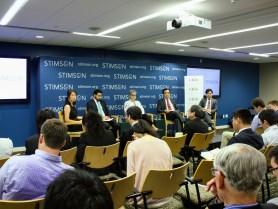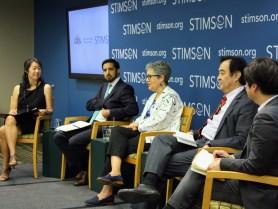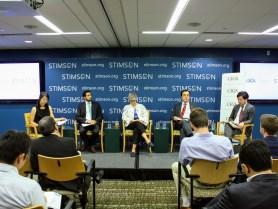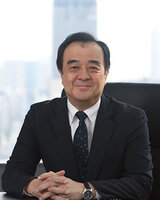Event Report Foreign Affairs and National Security
CIGS and Stimson Joint Seminar "Eurasia Strategy: American and Japanese Perspectives"
June 16, 2017,
9:30
- 11:30
Venue: 1211 Connecticut Ave NW, 8th FL, Washington, DC 20036



(Ms. Tatsumi, Mr. Lalwani, Ms. Laipson, Mr. Miyake and Mr. Jimbo from the left)
Seminar outline
Title: "Eurasia Strategy: American and Japanese Perspectives"
Speakers:
Ellen Laipson, Distinguished Fellow and President Emeritus, Stimson Center
Sameer Lalwani, Senior Associate and Deputy Director of the South Asia Program, Stimson Center
Kunihiko Miyake, Research Director, CIGS
Yuki Tatsumi, Director of the Japan Program, Stimson Center and Senior Research Fellow, CIGS
Ken Jimbo, Senior Research Fellow, CIGS
Summary of Seminar
Summary of SeminarPDF:159KB
Abstract of the Speech
In an era of globalization, it is increasingly difficult to have region-specific discourse when discussing a country's national security strategy. In particular, we have seen in recent years a growing connectivity between the developments in Europe and Asia. One might say the time is ripe to discuss Eurasia strategy.
Speaker's profile
Ellen Laipson is a Distinguished Fellow and President Emeritus of Stimson. Laipson joined Stimson in 2002, after 25 years of government service. Her last post was Vice Chair of the National Intelligence Council (1997-2002). She also served on the State Department's policy planning staff and was a specialist in Middle East affairs for the Congressional Research Service. She is a member of the Council on Foreign Relations, and serves on the International Advisory Council of the International Institute of Strategic Studies. She served on the board of the Asia Foundation (2003-2015). She was a member of President Obama's Intelligence Advisory Board from 2009-2013, and sat on the Secretary of State's Foreign Affairs Policy Board 2011-2014. Laipson has an M.A. from the School of Advanced International Studies, Johns Hopkins University and an A.B. from Cornell University.
Sameer Lalwani is a Senior Associate and Deputy Director for Stimson's South Asia program. From 2014-15, Lalwani was a Stanton Nuclear Security Postdoctoral Fellow at the RAND Corporation. He completed his Ph.D. in political science at MIT and remains a Research Affiliate at MIT's Center for International Studies. His research interests include grand strategy, counterinsurgency, civil-military relations, ethnic conflict, nuclear security, and the national security politics of South Asia and the Middle East. Sameer has conducted field research in Pakistan, India, Sri Lanka, and the British archives. His work has been published through RAND, Oxford University Press, the Journal of Strategic Studies, Foreign Affairs, Foreign Policy, The National Interest, CTC Sentinel, The Los Angeles Times, The New York Times, and a number of other outlets. Previously he was a fellow at George Washington University's Institute for Security and Conflict Studies, a member of the CNAS Next Gen National Security Leaders Program, a participant in the CSIS Nuclear Scholars Initiative, and a policy analyst with the New America Foundation. He holds B.A. in political science from University of California, Berkeley.
Kunihiko Miyake is Research Director for Foreign and National Security Affairs at the Canon Institute for Global Studies. He is also a Visiting Professor at Ritsumeikan University. From 2006-2007, he was Executive Assistant to Akie Abe in the Office of the Prime Minister of Japan. Miyake joined the Ministry of Foreign Affairs in Japan (MOFA) in 1978. Until he left MOFA in 2005, he served in a number of senior positions, including Deputy Director-General of the Middle East Bureau; Minister at the Embassy of Japan in Iraq and Japan's Representative to the Coalition Provisional Authority; Charge d'Affaires at the Embassy of Japan in Iraq, Minister for Public Affairs at the Embassy of Japan in China; and Directors of Japan-U.S. Security Treaty Division, First Middle East Division and Second Middle East Division in MOFA. He graduated from the Law Faculty of the University of Tokyo.
Yuki Tatsumi is the Director of the Japan Program at the Stimson Center. Previously, Tatsumi worked as a research associate at the Center for Strategic and International Studies and as the Special Assistant for Political Affairs at the Embassy of Japan in Washington, D.C. In September 2006, Tatsumi testified before the House Committee on International Relations. She is a recipient of the 2009 Yasuhiro Nakasone Incentive Award and earned the Letter of Appreciation from the Ministry of National Policy of Japan in 2012 for her contributions to advancing mutual understanding between the United States and Japan. A native of Tokyo, Tatsumi holds a B.A. in liberal arts from the International Christian University in Tokyo, Japan and an M.A. in international economics and Asian studies from the Paul H. Nitze School of Advanced International Studies (SAIS) at Johns Hopkins University in Washington, D.C.
Ken Jimbo is an Associate Professor at the Faculty of Policy Management, Keio University. He is concurrently a Senior Research Fellow at the Canon Institute for Global Studies and the Tokyo Foundation. He also serves as a Director on the Board of Directors at the Civic Force, a Visiting Fellow at the Genron NPO, and is a member of the International Institute for Strategic Studies. His main research fields are in international security, Japan-U.S. security relations, Japanese foreign and Defense policy, multilateral security in Asia-Pacific, and regionalism in East Asia. He has been a policy advisor at various Japanese governmental commissions and research groups including at the National Security Secretariat, the Ministry of Defense, and the Ministry of Foreign Affairs. His recent books and articles include "Japan-U.S.-Australia Cooperation on Capacity Building in Southeast Asia," in Yuki Tatsumi ed., U.S.-Japan-Australia Security Relations: Prospects and Challenges (Stimson Center, 2015); "U.S. Rebalancing to the Asia-Pacific: A Japanese Perspective," in William Tow and Douglas Stuart eds., The New U.S. Strategy towards Asia: Adapting to the American Pivot (London: Routledge, 2015); Ken Jimbo ed., Regional Security Architecture in the Asia-Pacific, Tokyo Foundation (2010) (in Japanese: Ajia Taiheiyo no Chiiki Anzen Hosho Ahkitekucha).


